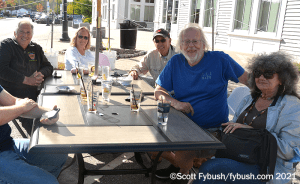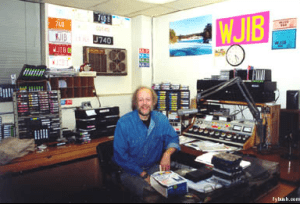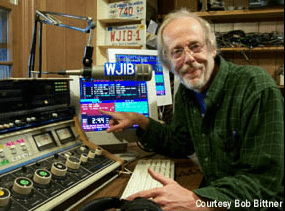Scott Fybush wrote a beautiful eulogy about Bob Bittner

*In almost 30 years of writing this column, I have never wanted to write a story less than I do this one: on Friday morning, Bob Bittner, the iconoclastic owner of WJIB (740) in Boston, WJTO (730) in Bath, Maine and several other stations, died at his home in Bath, two weeks short of what would have been his 74th birthday.

More than just a unique one-man radio operator, Bob was a good friend, not only to me but to broadcasters all over New England and beyond, all of whom are keenly feeling his loss right now.
Born in Washington, DC on June 12, 1949, Bob grew up in Virginia Beach and northern New Jersey, where he developed an interest in radio. As a teenager, he rode his bicycle long distances to visit radio stations in the Hudson Valley and Connecticut; among his visits was one to WGCH in Greenwich not long after it signed on in 1964, when Bob would have been 15.
After high school, Bob attended the Rochester Institute of Technology, where he majored in photography and graphic design and worked at college radio station WITR, then a carrier-current AM at the school’s downtown campus. His graphic design skills were put to immediate use, as his hand-drawn logos graced WITR music lists and ads.
He remained in the Rochester area after graduating in 1969, working for little AM station WADD (“the big Plus”) in Brockport and then for Rochester FM stations WCMF and WVOR, where he designed station graphics and rose to the position of program director, moving from WCMF’s progressive rock (never quite his style) to WVOR’s middle-of-the-road offerings as it evolved from beautiful music.
His lifelong interest in traveling the islands of the Caribbean grew out of a job in San Juan, Puerto Rico in the mid-1970s, when he programmed English-language station WHOA (870).
Bob returned to the mainland at the height of the disco revolution, working as a DJ and program director at Boston radio stations WBOS, WNTN and WXKS(AM). At WNTN, he began playing his unique brand of offbeat oldies and standards, and later in the 1980s he remained with WXKS during its transition to the “Music of Your Life” format, where he was first able to play the big bands and standards he loved.
For much of the later 1980s, he moved away from radio to a new career publishing a successful dating magazine in Boston. He continued traveling and pursuing another lifelong hobby, collecting license plates, many of them made to his custom requests by motor vehicle departments across the Caribbean.
Bob returned to radio in 1991, buying a small AM radio station in Cambridge out of bankruptcy. WLVG (740) was the latest incarnation of what had once been WTAO and then WCAS, the quirky folk-music daytimer that had an outsize influence on Boston radio in the 1970s. By the time Bob put in his bid for $277,115 at bankruptcy court, the station had been run into the ground by a local pastor, E. W. Jackson (who would later go on to an unsuccessful political career in Virginia.)
Bob moved the studios back to the transmitter site at the original Harvey Radio Labs building where WTAO had gone on the air in 1948, renaming 740 WWEA, “Earth Radio,” and using its airwaves to play a mix of music and environmental messages. In the summer of 1992, he reclaimed the WJIB callsign that had belonged to WTAO’s erstwhile FM sister station, which had recently changed formats from beautiful music to smooth jazz. With the help of chief engineer Peter George and a bank of VHS Hi-Fi tape machines that could run for eight hours at a stretch, he was able to automate his own format that mixed easy listening music with big bands and vocalists.

This is where your editor enters the story: just out of college and working across the Charles River at WBZ, I began to visit Bob on a regular basis, thrilled by his tales of the radio industry in Rochester, Boston and beyond and by the collections of memorabilia he had accumulated over the years. Before long, I was one of his co-hosts on “Let’s Talk About Radio,” a weekly talk show he started to, yes, talk about radio.
His little radio empire began a tentative expansion beyond Boston, adding AM stations in Worcester (WNEB) and Manchester, N.H. (WKBR) that were on the verge of going off the air, only to be revived, at least temporarily, by Bob’s automated music formats. Before easy access to internet audio delivery, Bob spent many hours on the road loading automation at those stations before eventually tiring of the workload and selling them in 1996-97.
He soon found a new way to expand WJIB’s reach, purchasing daytimer WJTO (730) in Bath, right next door on the dial and with a commanding coastal signal that covered all the way down the shore to where WJIB took over. For a time, he and new wife Raisa lived in Rowley, Mass., halfway between the stations, but when the opportunity arose to buy the house right on the road leading in to WJTO’s scenic bayside studio/transmitter site, he moved to West Bath and never looked back.
As a Mainer, Bob enjoyed hosting his friends (and sometimes listeners) at the WJTO complex, and he began growing again in a more focused way, acquiring AM stations in Portland (WLVP), Lewiston (WLAM), Augusta (WJYE) and eventually WBAS (1240) on Cape Cod, his final purchase. WJTO, WJIB and WBAS were tied together as a simulcast, while the stations in Portland and Lewiston (and Augusta, until it was sold off) ran separate versions of his formats, now much easier to automate from computers at their transmitter sites.
A lover of AM radio (including AM stereo, still heard in daytime hours on WJIB), Bob also added FM translators as the opportunity arose; your editor was delighted to assist him in moving a WJTO translator into Boston to relay WJIB, then to apply for new translators for WJTO and his other stations.
As his listeners soon learned, with no board of directors to oversee him or any debt to carry, Bob was able used his one-man radio stations for more than just playing his music collection. With no desire or any real need to sell commercials, he turned to listener support. His annual appeals raised tens of thousands of dollars in small donations from a passionate base of fans, all sent by check to his post office box in Maine. With no need to please advertisers, he was free to share his own views during station announcements, including a long-running crusade against credit cards and a disdain for big business.

I
It’s easy to call small stations “unique,” and we’ve certainly seen plenty, but Bob’s stations truly broke the mold. He played exactly what he felt like playing, from deep in the organized clutter that filled room after room at WJTO, and if he didn’t want to do something, he simply didn’t. His stations never streamed, and for years he wouldn’t play anything by Bob Dylan, not because he didn’t like Dylan but because he didn’t want to pay royalties to SESAC. His logos and signs were always hand-drawn and distinctively Bob.
We last saw Bob in Bath in the early fall of 2021, when we
toured WJTO and enjoyed a leisurely outdoor lunch with Bob and Raisa and several of his fellow independent broadcasters and friends, Marshall Sanft (“Bruce Marshall”) of WARE and Bob Vinikoor, who’d sold his Connecticut Valley cluster.
A lifelong collector, Bob was proud of his license plates (he sponsored your editor’s membership in the Automobile License Plate Collectors Association, often traveled to ALPCA conventions and had dozens of custom “730” and “740” plates he’d cadged out of motor vehicle bureaus across the Caribbean), as well as his tens of thousands of records, which he carefully remastered for radio airplay, and of his extensive radio memorabilia.
In addition to Raisa and his radio stations in Bath, Cambridge, Lewiston, Portland and Augusta, Bob leaves behind a community of lifelong radio friends across New England and beyond.
What happens next? In the very short term, the stations are staying on the air, with Bob’s Maine engineer Bob Perry adding an hourly announcement about Bob’s death to the station automation. In the long term, it’s simply too soon to speculate. It’s hard to imagine Bob’s stations without Bob – but those are decisions that will be made later on, as Bob’s radio friends rally around Raisa in her time of need.
There are no plans yet for a memorial, but the hope is to have a radio gathering at some point in Bath, and of course we’ll provide details as they become available.



 I
I

www.bostonmagazine.com

 that lass out,
that lass out,


www.bostonmagazine.com

www.bostonmagazine.com
